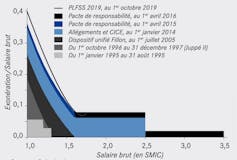How to republish
Read the original article and consult terms of republication.
What would be the consequences of increasing the French minimum wage (SMIC)?
By Yannick L’Horty, Economist, Professor, Université Gustave Eiffel
Since 2021, as part of improving the labour market and pandemic recovery, growing inflation and decreased purchasing power, the idea of increasing minimum wage (Salaire Minimum de Croissance or SMIC) has been gaining traction in French public debate. A true marker of left-wing parties and a constant, historic demand from workers’ unions, this plan appears in the first chapter of the “shared government programme” published by the Nouvelle Union Populaire Économique et Sociale (NUPES), who achieved second place in the first round of the legislative elections (25,66 %), on 12 June, just behind the presidential majority (25.75%).
NUPES wants to raise minimum wage to €1,500 net per month, i.e. an increase of more than 15%. The same plan appeared in the platforms of all left-wing candidates at the presidential election.
The idea of significantly raising minimum wage goes against the French strategy of wage moderation, in force for over fifteen years, reflected in the absence of any real “boost” to the SMIC. The only exception to this rule was the discretionary increase of 0.6% on 1 July 2012, introduced following the election of François Hollande as France’s president. Since the SMIC expert committee was created in 2009, each successive government has followed the recommendations of its annual reports, to the letter, which have advised to refrain from any boost in order to support competitiveness and employment.
On this topic, there is also a draft European directive aiming to harmonise minimum wages in Europe, with 22 countries out of the 27 implementing minimum salaries, from €332 gross in Bulgaria to €2,257 in Luxembourg, according to 2022 data published by Eurostat.
Harmonisation would not necessarily mean increasing the minimum wage in countries such as France, where it is already high, but the idea of greater European coordination in the area of wages raises the question of minimum wage management in new terms. In this new context, what arguments support increasing minimum wage, and what would be the effects of such a change?
The poor excuse of inflation
Maintaining purchasing power in a context hit once again by inflation, now close to 5% on a yearly basis, is not a satisfactory argument to support an additional increase in France’s minimum wage. The SMIC increases over time automatically with prices, so as to at least maintain purchasing power at a certain baseline. These rises are precisely framed by Law no. 70-7 of 2 January 1970 “reforming the guaranteed minimum wage and creating a minimum growth wage”.
The “Salaire Minimum Interprofessionnel Garanti” (SMIG) was created in 1950, in a context of tension over raw material prices following the Korean War. From its creation, it guaranteed strict indexation according to inflation. The same was true for the SMIC, automatically indexed for over fifty years in line with the consumer price index (with tobacco removed in 1992).
Article 31 xc of the Law of 1970 states that:
“When this index reaches a level corresponding to a rise of at least 2 p. 100 compared to the index observed immediately prior to the establishment of the minimum growth wage, the minimum growth wage is raised by the same proportion from the first day of the month following the publication of the index leading to this rise.”
This is why the SMIC was automatically increased by 2.45% on 1 May 2022, i.e. around €34/month, after two other increases in seven months. The monthly gross SMIC is now €1,645.58 for 35 hours of weekly work (i.e. €1,302.64 net and €10.85 brut per hour worked).
A tool to fight wage inequality
The best argument from supporters of raising the minimum wage is probably that doing so would fight wage inequality. Certainly, differences in salary only contribute a small part to income inequality as a whole, but this is an area where the government can take action by adjusting the SMIC.
By making low pay illegal, minimum wage plays a powerful role in compressing salary hierarchies. It shortens salary distributions, which reduces the number of jobs but automatically reduces disparities in compensation as well. This two-fold effect of minimum wage, negative for employment but positive for inequality, has been known in economic literature since the seminal study published by George Stigler in 1946 in American Economic Review.
In France, it is clear that the clauses increasing the SMIC cannot fight wage inequality alone. The minimum wage is only semi-indexed to average hourly salaries, with the hourly rate of the base worker and employee salary (SHBOE) as the reference index.
Over the past fifteen years, if we exclude the post-electoral increase in 2012, the continued lack of a “boost” to the SMIC would seem to go against the spirit of the 1970 law. According to Insee data, the purchasing power of workers on SMIC has fallen behind that of labourer and employees, whose hourly base salary (SHBOE) is used as the reference index. Since the 2006 increase, the cumulated difference represents a total of 3.6%, despite the 2012 revaluation.
What effects on jobs?
In the Stigler model, reducing wage inequality by increasing minimum wage has the counter-effect of reducing the number of jobs. This is one of the predictions most studied by economists: the search “minimum wage” has 2.5 million hits on Google Scholar. However, it is extremely difficult to empirically confirm this connection, as the minimum wage is applied extremely broadly.
In the case of France, in the law of 12 February 1950, the “I” in “SMIG” stood for “interprofessional”. From the beginning, this mechanism applied to every sector. In the 1970 law, which established the “minimum growth salary”, the interprofessional aspect remained in place. This vast breadth of application means that researchers cannot create a satisfactory counter-case to evaluate the impact of increasing the minimum wage by comparing an affected group and a control group, which considerably limits the scope of their assessments and encourages caution.
One of the most cited studies in economics, with over 3,000 citations, is that by David Card and Alan Krueger, (1993 then updated in 2015), analysing the effects of raising the minimum wage in New Jersey by comparing jobs in fast-food restaurants in that state and Pennsylvania. This research was also recognised by the committee for the Sveriges Riksbank Prize in Economic Sciences in Memory of Alfred Nobel, co-awarded to David Card in 2021. It concludes that raising the minimum wage has no effect on jobs.
In France, the empirical evidence mainly relates to the effects of the cost of underqualified work on employment. Many studies have evaluated the impact of programmes that exempt individuals from social welfare contributions, rolled out over the years since the early 1990s. Nowadays, these programmes represent over €50 billion euros, since the tax credit for competitiveness and employment (CICE) was transformed into exemptions from said contributions in 2019.

The summary of this research by the Council of Economic Analysis (CAE) confirms that employment is very sensitive to the cost of labour, when a rise in the SMIC causes it to go up. A significant increase in the minimum wage would therefore contribute to increasing unemployment. This is also why increases in the SMIC have been compensated by exemptions in the past. But this strategy is now meeting its limits, with the end of all exemptions, now acquired at the SMIC level.
At present, labour shortages in certain sectors and the perspective of a return to full employment are changing the game. These shifts seem likely to change the priorities awarded to employment and competitiveness, which have led to continuous expansion of welfare exemptions for low and medium salaries. In this new context, the effects of increasing the minimum wage on employment should be better documented.
Identity card of the article
| Original title: | Quelles seraient les conséquences d’une hausse du smic ? |
| Author: | Yannick L’Horty |
| Publisher: | The Conversation France |
| Collection: | The Conversation France |
| Lincense: | This article is republished from The Conversation France under a Creative Commons license. Read the original article. An English version was created by Hancock & Hutton for Université Gustave Eiffel and was published by Reflexscience under the same license. |
| Date: | September 2022 |
| Languages: | French and english |
| Mots clés: | Employment, competitiveness, salaries, minimum wage,inflation, economic policy, purchasing power,legislative elections,Nouvelle Union Populaire Écologique et Sociale (NUPES). |

![[Translate to English:] Licence creative commons BY-SA 4.0 [Translate to English:] Licence creative commons BY-SA 4.0](https://reflexscience.univ-gustave-eiffel.fr/fileadmin/ReflexScience/Accueil/Logos/CCbySA.png)